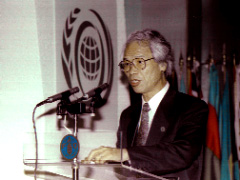


INTERNATIONAL ATOMIC ENERGY AGENCY (IAEA) - AGENCE INTERNATIONALE DE L'ENERGIE ATOMIQUE - ORGANISMO INTERNACIONAL DE ENERGIA ATOMICA | ||
Mr. Sueo Machi, Deputy Director-General, and Head, Department of Research and Isotopes, International Atomic Energy Agency (IAEA) | ||

The International Atomic Energy Agency (IAEA) is best known for its statutory role in the verification of the International Safeguards Agreement relating to the non-proliferation of nuclear weapons. The recent agreement to extend indefinitely the Treaty on Non-Proliferation of nuclear weapons means a renewed and collective commitment by the world community to the exclusively peaceful use of nuclear energy. The Declaration from this World Food Summit is equally historic, pledging a commitment to rid the world of hunger and malnutrition. These two events are closely related because without international security against weapons of mass destruction, the prospects for global food security are significantly diminished. The IAEA effort to strengthen and safeguard will therefore contribute to the longer term objective of this Summit. The IAEA also has a role to encourage the peaceful application of atomic energy and therefore, the NPT extension also strengthens international commitment to assist the developing countries in using nuclear technology for their socio-economic development. At present, only some developing countries use nuclear power but many developing countries use non-power nuclear applications in order to solve some of the pressing constraints to sustainable agricultural development. For more than 30 years, the IAEA has worked in partnership with member countries and FAO through its regular and Technical Cooperation Programme, to develop and use nuclear technology such as plant mutation breeding, the sterile insect technique, immunology method and food irradiation for improving crop and livestock production, as well as to protect the environment and stimulate trade. The benefits have been impressive. For example, more than 2000 mutant varieties of food and industrial crops have been officially released and mutant varieties are now growing on millions of hectares of land, particularly in countries in the Asia region like China, India, Japan, Myanmar and Pakistan. These have produced significant improvements in yield, resistance to disease and climatic stress and therefore, have enhanced food security by increasing both the availability of food and the availability of raw materials for local industry or export. The sterile insect technique using nuclear technology, which involves the release over an extensive area of land of large numbers of insects sterilized by radiation, has been used successfully to eradicate the new world screwworm fly and the Mediterranean fruit fly from the North and much of Central America. It was this technology, the sterile insect technique, which was the basis for eradicating the screwworm from Libya in 1991. The use of this technique brings benefits totalling several billions of United States dollars each year to countries such as Chile, Guatemala, Japan, Mexico and the United States, in terms of increased trade and reduced pesticides, reduced residues in food and environment protection. Molecular techniques are also helping greatly to assist efforts to eradicate animal diseases such as rinderpest and foot and mouth disease from Africa, Latin America and Asia. These diseases not only reduce meat and milk production but also act as significant barriers to international trade in livestock and livestock products. The IAEA's cooperation with FAO, the European Union, and the Organization of African Unity and other regional bodies will hopefully lead to the eradication of these diseases within the timeframe being considered by this Summit. Finally, food irradiation which was for a longtime a controversial technology and was largely redirected to the spice trade is now being used commercially by 29 countries for this and other kinds of commodities. It is also increasingly being considered as an effective option to chemical fumigation for quarantine treatment for foods and eliminating food-borne pathogens which are nowadays so much in the news. The seven Commitments and adherence to the actions contained within the World Food Summit Plan of Action are essential for attaining the objective of reducing by half the number of hungry and undernourished people in less than 20 years. The International Atomic Energy Agency welcomes the convening of this Summit and it stands committed to work with member countries, FAO and others in the international, as well as in local communities, to remove hunger and malnutrition from the face of our society. | ||
|
|
|
|

 |